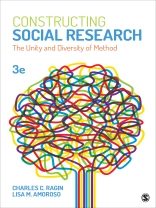The updated Third Edition of this innovative text shows the unity within the diversity of activities called social research to help students understand how all social researchers construct representations of social life using theories, systematic data collection, and careful examination of that data. The book tackles questions like ‘What is social research?’, ‘How does it differ from journalism, documentary film-making, or laboratory research in the natural sciences?’, and ‘What is the researcher′s obligation to those he or she is studying?’
Updated throughout with new references and examples, this edition is designed to evoke challenging questions regarding the nature of representation and the ethical challenges facing social scientific researchers. The text moves beyond standard research challenges to push readers to see the complex relationships among ethics, ideas, evidence, and outcomes.
สารบัญ
Preface
Acknowledgments
PART I: ELEMENTS OF SOCIAL RESEARCH
CHAPTER 1: What Is (and Is Not) Social Research?
Introduction
Some Conventional Views of Social Research
Social Research and Other Ways of Representing Social Life
How Social Research Differs
Conclusion
CHAPTER 2: The Goals of Social Research
Introduction
Seven Main Goals
The Link Between Goals and Strategies
The Social Nature of Social Research
CHAPTER 3: The Process of Social Research: Ideas and Evidence
Introduction
The Interpretive Model of Social Research
Processes and Strategies of Social Research
The Challenge of Social Research
CHAPTER 4: The Ethics of Social Research
Introduction
Ethical Dilemmas and Failures
The Troubled History of Ethical Research
The Current Ethical Standards and Institutional Oversight
Ethical and Professional Dilemmas Facing Social Researchers
The Problem of Representation
Conclusion
PART II: STRATEGIES OF SOCIAL RESEARCH
CHAPTER 5: Using Qualitative Methods to Study Commonalities
Introduction
The Goals of Qualitative Research
The Process of Qualitative Research
Using Qualitative Methods
The Study of a Single Case
Conclusion
CHAPTER 6: Using Comparative Methods to Study Diversity
Introduction
Contrasts With Other Research Strategies
The Goals of Comparative Research
The Process of Comparative Research
Using Comparative Methods
Conclusion
CHAPTER 7: Using Quantitative Methods to Study Covariation
Introduction
The Goals of Quantitative Research
Contrasts With Other Research Strategies
The Process of Quantitative Research
Using Quantitative Methods
Conclusion
Afterword: The Promise of Social Research With Mary Driscoll
Appendix: Computing Correlation Coefficients
References
Glossary/Index
About the Authors
เกี่ยวกับผู้แต่ง
Lisa M. Amoroso spent her childhood in Pittsburgh and the suburbs of Chicago. She attended Northwestern University for her BA in economics and mathematical methods in the social sciences. After working in software development and management systems, she returned to Northwestern and the Kellogg School of Management, where she completed her Ph D in a joint program in sociology and organization behavior in 2003. Since leading her first seminar at Northwestern in 1997, she has been teaching in the Midwest—at Northwestern, Beloit College, Roosevelt University, and currently Dominican University in River Forest, Illinois. Research methods and quantitative analysis are among her favorite courses to teach. In 2010, she joined Dominican’s Brennan School of Business where she is a Professor of Management. She received Excellence in Teaching awards at Roosevelt in 2007 and at the Brennan School of Business in 2016. Although her primary focus is teaching, she publishes research on diversity education, social identity, status hierarchies, and student learning. She has published in variety of journals including Psychological Inquiry and Journal of Management Education. She is married to Phil Tracy, and they have two children, Nate and Carmen.












